Origin: (Robert Langdon Book 5) Read online
Page 37
When Langdon recognized her face, he managed a weak smile.
“Thank God,” Ambra said, exhaling all at once. “We heard the gunshot.” She crouched beside him. “Stay down.”
As Langdon’s awareness returned, he felt a sudden rush of fear. “The man who attacked—”
“He’s gone,” Ambra whispered, her voice calm. “You’re safe.” She gestured over the edge of the shaft. “He fell. All the way down.”
Langdon strained to absorb the news. It was all slowly coming back. He fought to clear the fog from his mind and take inventory of his wounds, his attention moving to the deep throbbing in his left hip and the sharp pain in his head. Otherwise, nothing felt broken. The sound of police radios echoed up the stairwell.
“How long … have I been …”
“A few minutes,” Ambra said. “You’ve been in and out. We need to get you checked.”
Gingerly, Langdon pulled himself to a sitting position, leaning against the wall of the staircase. “It was the navy … officer,” he said. “The one who—”
“I know,” Ambra said, nodding. “The one who killed Edmond. The police just ID’d him. They’re at the bottom of the stairwell with the body, and they want a statement from you, but Father Beña told them nobody comes up here before the medical team, who should be here any minute now.”
Langdon nodded, his head pounding.
“They’ll probably take you to the hospital,” Ambra told him, “which means you and I need to talk right now … before they arrive.”
“Talk … about what?”
Ambra studied him, looking concerned. She leaned down close to his ear and whispered, “Robert, don’t you remember? We found it—Edmond’s password: ‘The dark religions are departed and sweet science reigns.’”
Her words pierced the fog like an arrow, and Langdon bolted upright, the murkiness in his mind clearing abruptly.
“You’ve brought us this far,” Ambra said. “I can do the rest. You said you know how to find Winston. The location of Edmond’s computer lab? Just tell me where to go, and I’ll do the rest.”
Langdon’s memories rushed back now in torrents. “I do know.” At least I think I can figure it out.
“Tell me.”
“We need to go across town.”
“Where?”
“I don’t know the address,” Langdon said, now climbing unsteadily to his feet. “But I can take you—”
“Sit down, Robert, please!” Ambra said.
“Yes, sit down,” a man echoed, coming into view on the stairs below them. It was Father Beña, trudging up the staircase, breathless. “The EMTs are almost here.”
“I’m fine,” Langdon lied, feeling woozy as he leaned against the wall. “Ambra and I need to go now.”
“You won’t get very far,” Beña said, climbing slowly. “The police are waiting. They want a statement. Besides, the church is surrounded by media. Someone tipped off the press that you’re here.” The priest arrived beside them and gave Langdon a tired smile. “By the way, Ms. Vidal and I are relieved to see you’re okay. You saved our lives.”
Langdon laughed. “I’m pretty sure you saved ours.”
“Well, in either case, I just want you to know that you’ll be unable to leave this stairwell without facing the police.”
Langdon carefully placed his hands on the stone railing and leaned out, peering down. The macabre scene on the ground seemed so far away—Ávila’s awkwardly splayed body illuminated by the beams of several flashlights in the hands of police officers.
As Langdon peered down the spiral shaft, once again noting Gaudí’s elegant nautilus design, he flashed on the website for the Gaudí museum in the basement of this church. The online site, which Langdon had visited not long ago, featured a spectacular series of scale models of Sagrada Família—accurately rendered by CAD programs and massive 3-D printers—depicting the long evolution of the structure, from the laying of its foundation all the way to the church’s glorious future completion, still at least a decade away.
Where do we come from? Langdon thought. Where are we going?
A sudden memory struck him—one of the scale models of the church’s exterior. The image was lodged in his eidetic memory. It was a prototype depicting the church’s current stage of construction and was titled “Sagrada Família Today.”
If that model is up-to-date, then there could be a way out.
Langdon turned suddenly to Beña. “Father, could you please relay a message from me to someone outside?”
The priest looked puzzled.
As Langdon explained his plan to get out of the building, Ambra shook her head. “Robert, that’s impossible. There’s nowhere up there for—”
“Actually,” Beña interjected, “there is. It won’t be there forever, but at the moment, Mr. Langdon is correct. What he’s suggesting is possible.”
Ambra looked surprised. “But Robert … even if we can escape unseen, are you sure that you shouldn’t go to the hospital?”
Langdon wasn’t sure of very much at this point. “I can go later if I need to,” he said. “Right now, we owe it to Edmond to finish what we came here to do.” He turned to Beña, looking him directly in the eye. “I need to be honest with you, Father, about why we are here. As you know, Edmond Kirsch was murdered tonight to stop him from announcing a scientific discovery.”
“Yes,” the priest said, “and from the tone of Kirsch’s introduction, he seemed to believe this discovery would deeply damage the religions of the world.”
“Exactly, which is why I feel you should know that Ms. Vidal and I came to Barcelona tonight in an effort to release Edmond Kirsch’s discovery. We are very close to being able to do that. Meaning …” Langdon paused. “In requesting your help right now, I’m essentially asking you to help us globally broadcast the words of an atheist.”
Beña reached up and placed a hand on Langdon’s shoulder. “Professor,” he said with a chuckle, “Edmond Kirsch is not the first atheist in history to proclaim that ‘God is dead,’ nor will he be the last. Whatever it is that Mr. Kirsch has discovered, it will no doubt be debated on all sides. Since the beginning of time, the human intellect has always evolved, and it is not my role to impede that development. From my perspective, however, there has never been an intellectual advancement that has not included God.”
With that, Father Beña gave them both a reassuring smile and headed down the stairs.
Outside, waiting in the cockpit of the parked EC145 helicopter, the pilot watched with rising concern as the crowd outside Sagrada Família’s security fence continued to grow. He had not heard from the two Guardia agents inside and was about to radio in when a small man in black robes emerged from the basilica and approached the chopper.
The man introduced himself as Father Beña and relayed a shocking message from inside: both Guardia agents had been killed, and the future queen and Robert Langdon required evacuation at once. As if this weren’t startling enough, the priest then told the pilot where precisely he was to collect his passengers.
Impossible, the pilot had thought.
And yet now, as he soared over the spires of Sagrada Família, he realized that the priest had been correct. The church’s largest spire—a monolithic central tower—had not yet been built. Its foundation platform was a flat circular expanse, nestled deep among a cluster of spires, like a clearing in a forest of redwoods.
The pilot positioned himself high above the platform, and carefully lowered the chopper down among the spires. As he touched down, he saw two figures emerge from a stairwell—Ambra Vidal assisting an injured Robert Langdon.
The pilot jumped out and helped them both inside.
As he strapped them in, the future queen of Spain gave him a weary nod.
“Thank you very much,” she whispered. “Mr. Langdon will tell you where to go.”
CHAPTER 78
ConspiracyNet.com
BREAKING NEWS
PALMARIAN CHURCH
KILL
ED EDMOND KIRSCH’S MOTHER?!
Our informant [email protected] has come through with yet another blockbuster revelation! According to exclusive documents verified by ConspiracyNet, Edmond Kirsch has attempted for years to sue the Palmarian Church for “brainwashing, psychological conditioning, and physical cruelty” allegedly resulting in the death of Paloma Kirsch—Edmond’s biological mother—more than three decades ago.
Paloma Kirsch is alleged to have been an active member of the Palmarian Church who attempted to break free, was shamed and psychologically abused by her superiors, and hanged herself in a nunnery bedroom.
CHAPTER 79
“THE KING HIMSELF,” Commander Garza muttered again, his voice resonating across the palace armory. “I still can’t fathom that my arrest order came from the king himself. After all my years of service.”
Mónica Martín placed a silencing finger to her lips and glanced through the suits of armor at the entryway to make sure the guards were not listening. “I told you, Bishop Valdespino has the king’s ear, and has convinced His Majesty that tonight’s accusations against him are your doing, and that you’re somehow framing him.”
I’ve become the king’s sacrificial lamb, Garza realized, always having suspected that if the king were forced to choose between his Guardia Real commander or Valdespino, he would choose Valdespino; the two men had been lifelong friends, and spiritual connections always trumped professional ones.
Even so, Garza could not help but feel that something about Mónica’s explanation wasn’t entirely logical. “The kidnapping story,” he said. “You’re telling me that it was ordered by the king?”
“Yes, His Majesty called me directly. He ordered me to announce that Ambra Vidal had been abducted. He had concocted the kidnapping story in an effort to save the reputation of the future queen—to soften the appearance that she had literally run off with another man.” Martín gave Garza an annoyed look. “Why are you questioning me about this? Especially now that you know the king phoned Agent Fonseca with the same kidnapping story?”
“I can’t believe the king would ever risk falsely accusing a prominent American of kidnapping,” Garza argued. “He’d have to be—”
“Insane?” she interrupted.
Garza stared in silence.
“Commander,” Martín pressed, “remember that His Majesty is failing. Maybe this was just a case of bad judgment?”
“Or a moment of brilliance,” Garza offered. “Reckless or not, the future queen is now safe and accounted for, in the hands of the Guardia.”
“Exactly.” Martín eyed him carefully. “So what’s bothering you?”
“Valdespino,” Garza said. “I admit I don’t like him, but my gut says he can’t possibly be behind Kirsch’s murder, or any of the rest of it.”
“Why not?” Her tone was acerbic. “Because he’s a priest? I’m pretty sure our Inquisition taught us a few things about the Church’s willingness to justify drastic measures. In my opinion, Valdespino is self-righteous, ruthless, opportunistic, and overly secretive. Am I missing something?”
“You are,” Garza fired back, startled to find himself defending the bishop. “Valdespino is everything you say he is, but he is also a person for whom tradition and dignity are everything. The king—who trusts almost no one—has steadfastly trusted the bishop for decades now. I find it very hard to believe that the king’s confidant could ever commit the kind of treachery we’re talking about.”
Martín sighed and pulled out her cell phone. “Commander, I hate to undermine your faith in the bishop, but I need you to see this. Suresh showed it to me.” She pressed a few buttons and handed Garza her phone.
The screen displayed a long text message.
“This is a screenshot of a text message Bishop Valdespino received tonight,” she whispered. “Read it. I guarantee it will change your mind.”
CHAPTER 80
DESPITE THE PAIN coursing through his body, Robert Langdon felt strangely buoyant, almost euphoric, as the helicopter thundered off the roof of Sagrada Família.
I’m alive.
He could feel the adrenaline build up in his bloodstream, as if all of the events of the past hour were now hitting him all at once. Breathing as slowly as possible, Langdon turned his attention outward, to the world beyond the helicopter windows.
All around him, massive church spires reached skyward, but as the helicopter rose, the church dropped away, dissolving into an illuminated grid of streets. Langdon gazed down at the sprawl of city blocks, which were not the usual squares and rectangles but rather much softer octagons.
L’Eixample, Langdon thought. The Widening.
Visionary city architect Ildefons Cerdà had widened all the intersections in this district by shaving the corners off the square blocks to create mini plazas, with better visibility, increased airflow, and abundant space for outdoor cafés.
“¿Adónde vamos?” the pilot shouted over his shoulder.
Langdon pointed two blocks to the south, where one of the city’s widest, brightest, and most aptly named avenues cut diagonally across Barcelona.
“Avinguda Diagonal,” Langdon shouted. “Al oeste.” To the west.
Impossible to miss on any map of Barcelona, Avinguda Diagonal crossed the entire width of the city, from the ultramodern beachside skyscraper Diagonal ZeroZero to the ancient rose gardens of Parc de Cervantes—a ten-acre tribute to Spain’s most celebrated novelist, the author of Don Quixote.
The pilot nodded his confirmation and banked to the west, following the slanting avenue westward toward the mountains. “Address?” the pilot called back. “Coordinates?”
I don’t know the address, Langdon realized. “Fly to the fútbol stadium.”
“¿Fútbol?” He seemed surprised. “FC Barcelona?”
Langdon nodded, having no doubt the pilot knew exactly how to find the home of the famed Barcelona fútbol club, which was located a few miles farther up Avinguda Diagonal.
The pilot opened the throttle, now tracing the path of the avenue at full speed.
“Robert?” Ambra asked quietly. “Are you okay?” She studied him as if perhaps his head injury had impaired his judgment. “You said you know where to find Winston.”
“I do,” he replied. “That’s where I’m taking us.”
“A fútbol stadium? You think Edmond built a supercomputer at a stadium?”
Langdon shook his head. “No, the stadium is just an easy landmark for the pilot to locate. I’m interested in the building directly beside the stadium—the Gran Hotel Princesa Sofía.”
Ambra’s expression of confusion only deepened. “Robert, I’m not sure you’re making sense. There’s no way Edmond built Winston inside a luxury hotel. I think we should take you to the clinic after all.”
“I’m fine, Ambra. Trust me.”
“Then where are we going?”
“Where are we going?” Langdon stroked his chin playfully. “I believe that’s one of the important questions Edmond promised to answer tonight.”
Ambra’s expression settled somewhere between amused and exasperated.
“Sorry,” Langdon said. “Let me explain. Two years ago, I had lunch with Edmond at the private club on the eighteenth floor of the Gran Hotel Princesa Sofía.”
“And Edmond brought a supercomputer to lunch?” Ambra suggested with a laugh.
Langdon smiled. “Not quite. Edmond arrived for lunch on foot, telling me he ate at the club almost every day because the hotel was so convenient—only a couple of blocks from his computer lab. He also confided in me that he was working on an advanced synthetic intelligence project and was incredibly excited about its potential.”
Ambra looked suddenly heartened. “That must have been Winston!”
“My thoughts exactly.”
“And so Edmond took you to his lab!”
“No.”
“Did he tell you where it was?”
“Unfortunately, he kept that a secret.”
The concern rush
ed back into Ambra’s eyes.
“However,” Langdon said, “Winston secretly told us exactly where it is.”
Now Ambra looked confused. “No, he didn’t.”
“I assure you, he did,” Langdon said, smiling. “He actually told the whole world.”
Before Ambra could demand an explanation, the pilot announced, “¡Ahí está el estadio!” He pointed into the distance at Barcelona’s massive stadium.
That was fast, Langdon thought, glancing outside and tracing a line from the stadium to the nearby Gran Hotel Princesa Sofía—a skyscraper overlooking a broad plaza on Avinguda Diagonal. Langdon told the pilot to bypass the stadium and instead take them up high over the hotel.
Within seconds, the helicopter had climbed several hundred feet and was hovering above the hotel where Langdon and Edmond had gone to lunch two years ago. He told me his computer lab was only two blocks from here.
From their bird’s-eye vantage point, Langdon scanned the area around the hotel. The streets in this neighborhood were not as rectilinear as they were around Sagrada Família, and the city blocks formed all kinds of uneven and oblong shapes.
It has to be here.
With rising uncertainty, Langdon searched the blocks in all directions, trying to spot the unique shape that he could picture in his memory. Where is it?
It was not until he turned his gaze to the north, across the traffic circle at the Plaça de Pius XII, that Langdon felt a twinge of hope. “Over there!” he called to the pilot. “Please fly over that wooded area!”
The pilot tipped the nose of the chopper and moved diagonally one block to the northwest, now hovering over the forested expanse where Langdon had pointed. The woods were actually part of a massive walled estate.
“Robert,” Ambra shouted, sounding frustrated now. “What are you doing? This is the Royal Palace of Pedralbes! There is no way Edmond built Winston inside—”
“Not here! Over there!” Langdon pointed beyond the palace to the block directly behind it.

 Angels & Demons
Angels & Demons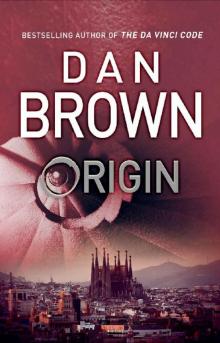 Origin
Origin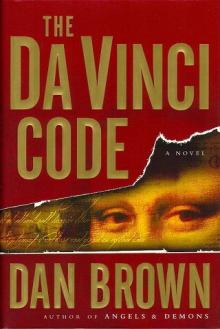 The Da Vinci Code
The Da Vinci Code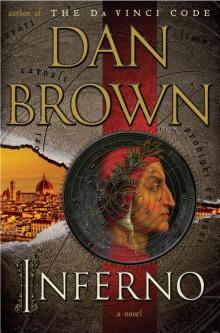 Inferno
Inferno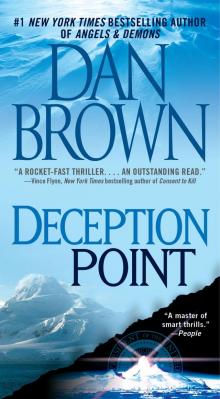 Deception Point
Deception Point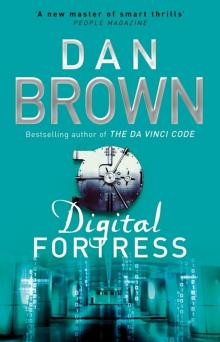 Digital Fortress
Digital Fortress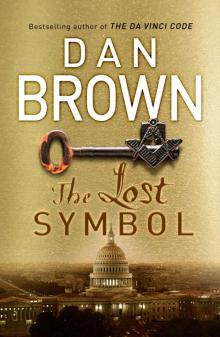 The Lost Symbol
The Lost Symbol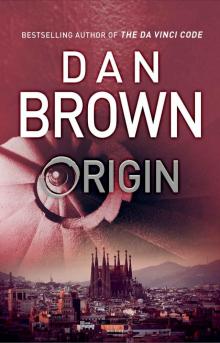 Origin: (Robert Langdon Book 5)
Origin: (Robert Langdon Book 5) Angles & Demons
Angles & Demons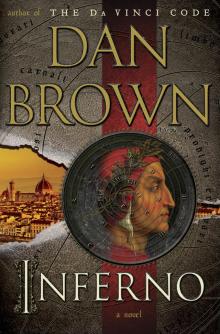 Inferno: A Novel
Inferno: A Novel Angels & Demons rl-1
Angels & Demons rl-1 The Great Expectations School
The Great Expectations School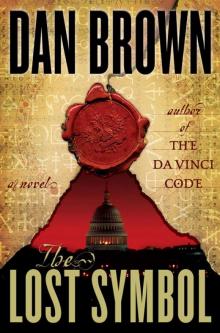 The Lost Symbol rl-3
The Lost Symbol rl-3 Angels and Demons
Angels and Demons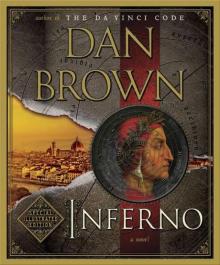 Inferno: Special Illustrated Edition: Featuring Robert Langdon
Inferno: Special Illustrated Edition: Featuring Robert Langdon